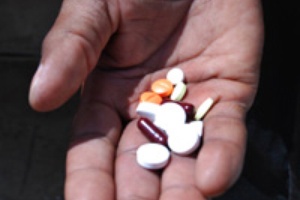South Africa: Activists protest as Novartis ruling approaches
At least a hundred protesters arrived at South Africa's parliament on 11 July to demonstrate their disapproval of the ongoing court case by Swiss pharmaceutical company Novartis against the Indian government over its patent laws. As the case draws to a close, health organizations say a win for the pharmaceutical company will be a loss to the developing world, which sources the bulk of its generic medicines from India.
Novartis approached the Indian government six years ago, seeking
to register a cancer drug already commonly marketed under the
name Gleevec. The patent was denied and a long-running court
battle ensued, but at each step Indian courts have ruled against
Novartis and the company has appealed.
India has laws against “evergreening”, a term used
to describe instances where drug companies maintain artificially
high prices on medicines for longer by continually extending
patent protection for minor modifications to existing drugs.
India's Supreme Court is expected to hand down the judgment that
will draw the legal saga to a close on 22 August. This could not
only limit the country's ability to produce generics, but also
set a precedent in other countries - like South Africa - looking
to revamp patent laws.
"A win for Novartis will restrict generic access to medicines
both within my country and across the world," Leena Menghaney,
manager of the Access Campaign in India at Médecins Sans
Frontières (MSF), an international NGO, said in a
statement. "The threat to the developing world is real -
millions of people rely on affordable drugs from India. If
patents are granted more easily in India, patients across the
world will see their supply of life-saving drugs dry up."
India, described as the "pharmacy of the developing
world”, is the world's leading producer of generic drugs.
The country has achieved this status in part because the
stringent Patent Act prevents evergreening by requiring new
drugs to show improved therapeutic efficacy over existing ones
to deserve a patent.
The Patent Act has been used to block previous patent
applications on fixed-dose antiretrovirals (ARVS) and paediatric
formulations of the ARV medication, nevirapine.
"As a person living with HIV, and reliant on generic medicines,
I call on Novartis to drop the case against the Indian
government," Sydney Makgai of the Treatment Action Campaign
(TAC), a South African AIDS lobby, said in a statement. "This
may be about profits for them, but it is about life and death
for me." More than 80 percent of Africa's ARVs are sourced from
generic producers in India.
South African patent laws need fixing
South African law has no provision against evergreening and has
issued patents for a number of previously registered medicines,
including Gleevec. MSF's Access Campaign said the
patent-protected Gleevec sells for about US$117 in the South
African private sector, but the generic equivalent from Cipla,
an Indian drug manufacturer, costs just one-tenth of the price.
Civil society organizations such as MSF, TAC and the human
rights NGO, SECTION27, are putting pressure on the government to
revise existing legislation to include a provision preventing
evergreening.
TAC senior researcher Catherine Tomlinson said the organizations
have spoken to South Africa's Department of Trade and Industry,
which has assured them that a policy document on the patent laws
will be released in June or July, with a three-month public
comment period.
Tomlinson told IRIN/PlusNews the organizations have now written
to the department calling for the document to be released.
PlusNews
http://www.plusnews.org/Report/95854/SOUTH-AFRICA-Activists-protest-as-Novartis-ruling-approaches


